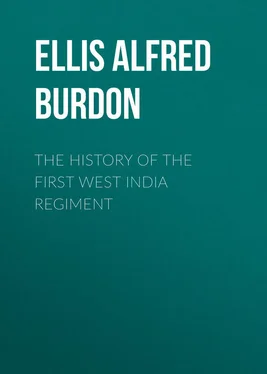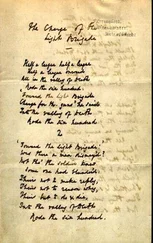Alfred Ellis - The History of the First West India Regiment
Здесь есть возможность читать онлайн «Alfred Ellis - The History of the First West India Regiment» — ознакомительный отрывок электронной книги совершенно бесплатно, а после прочтения отрывка купить полную версию. В некоторых случаях можно слушать аудио, скачать через торрент в формате fb2 и присутствует краткое содержание. Жанр: foreign_antique, foreign_prose, на английском языке. Описание произведения, (предисловие) а так же отзывы посетителей доступны на портале библиотеки ЛибКат.
- Название:The History of the First West India Regiment
- Автор:
- Жанр:
- Год:неизвестен
- ISBN:нет данных
- Рейтинг книги:3 / 5. Голосов: 1
-
Избранное:Добавить в избранное
- Отзывы:
-
Ваша оценка:
- 60
- 1
- 2
- 3
- 4
- 5
The History of the First West India Regiment: краткое содержание, описание и аннотация
Предлагаем к чтению аннотацию, описание, краткое содержание или предисловие (зависит от того, что написал сам автор книги «The History of the First West India Regiment»). Если вы не нашли необходимую информацию о книге — напишите в комментариях, мы постараемся отыскать её.
The History of the First West India Regiment — читать онлайн ознакомительный отрывок
Ниже представлен текст книги, разбитый по страницам. Система сохранения места последней прочитанной страницы, позволяет с удобством читать онлайн бесплатно книгу «The History of the First West India Regiment», без необходимости каждый раз заново искать на чём Вы остановились. Поставьте закладку, и сможете в любой момент перейти на страницу, на которой закончили чтение.
Интервал:
Закладка:
A. B. Ellis
The History of the First West India Regiment
INTRODUCTORY CHAPTER
At the present day, when our Continental neighbours are outvying each other in the completeness of their military organisations and the size of their armies, while in the United Kingdom complaints are daily heard that the supply of recruits for the British Army is not equal to the demand, it may not be out of place to draw the attention of the public to a source from which the army may be most economically reinforced.
The principal difficulty experienced by military reformers in their endeavours to remodel the British Army on the Continental system, is that caused by the necessity of providing troops for the defence of our vast and scattered Colonial Empire. Without taking into consideration India, our European and North American possessions, a considerable portion of the army has to be employed in furnishing garrisons for the Cape Colony, Natal, Mauritius, St. Helena, the Bermudas, the West Indies, Burmah, the Straits Settlements, Hong Kong, etc.; which garrisons, though creating a constant drain on the Home Establishment, are notoriously inadequate for the defence of the various colonies in which they are placed; and the result is that, whenever a colonial war breaks out, fresh battalions have to be hurriedly sent out from the United Kingdom at immense expense, and the entire military machine is temporarily disarranged.
In size, and in diversity of subject races, the British Empire may be not inaptly compared with that of Rome in its palmiest days; and we have, in a measure, adopted a Roman scheme for the defence of a portion of our dominions. The Romans were accustomed, as each new territory was conquered, to raise levies of troops from the subject race, and then, most politicly, to send them to serve in distant parts of the Empire, where they could have no sympathies with the inhabitants. In India we, like the Romans, raise troops from the conquered peoples, but, unlike them, we retain those troops for service in their own country. The result of this attempt to modify the scheme was the Indian mutiny.
The plan of a local colonial army was, however, first tried in the West Indies. At the close of the last century, when the West India Islands, or the Plantations, as they were then called, were of as much importance to, and held the same position in, the British Empire as India does now, there was in existence a West India Army, consisting of twelve battalions of negro troops, raised exclusively for service in the West Indies.
As India was gradually conquered, and the West India trade declined (from the abolition of the slave trade and other causes), the West India Colonies, by a regular process, fell from their former pre-eminent position. Each step in the descent was marked by the disbandment of a West India regiment, until, at the present day, two only remain in existence; and it is a matter of common notoriety that those two are principally preserved to garrison Sierra Leone, the Gold Coast Colony, British Honduras, and British Guiana – colonies the climates of which, experience has shown, are fatal to European soldiers, who are necessarily in time of peace, from the nature of their duties, more exposed to climatic influence than are officers. Economy was, of course, the cause of this continued process of reduction, for, until recently, such gigantic military establishments as those of Germany, Russia, and France were unheard of; and Great Britain was satisfied, and felt secure, with a miniature army, a paper militia, and no reserve. All this is now changed, and the necessity of an increase in our defensive power is admitted.
These negro West India troops won the highest encomiums from every British commander under whom they served. Sir Ralph Abercromby in 1796, Sir John Moore in 1797, Lieutenant-General Trigge in 1801, Sir George Provost in 1805, Lieutenant-General Beckwith and Major-General Maitland in 1809 and 1810, all testified to the gallantry, steadiness, and discipline of the negro soldiers. Sir John Moore, speaking of the new corps in 1796, said "they are invaluable," and "the very best troops for the climate." To come to more recent times, in 1873 the 2nd West India Regiment bore for six months the entire brunt of the Ashanti attack, and had actually forced the invading army to retire across the Prah before the men of a single line battalion were landed. In fact, the efficiency of West India troops was, and is, unquestioned.
This being so, it may be asked, why should not the present number of regiments composed of negro soldiers be increased for the purpose of garrisoning the colonies, especially those of which the climate is most prejudicial to English soldiers? This would not be a return to the former state of affairs, for when we had twelve negro regiments they were all stationed in the West Indies, whereas the essence of the present scheme is to send them on service in other colonies. Such an augmentation of our West India, or Zouave, regiments certainly appears politic and easy. I will also endeavour to show that it would be economical.
Each West India battalion would take the place of a Territorial battalion now serving abroad. The latter would return to the United Kingdom, be reduced to the Home Establishment, and have from 300 to 400 men passed into the Reserve. Repeat this process seven or eight times, and the services with the colours of between 2000 and 3000 European soldiers are dispensed with, the Reserve being increased by that number. In addition, negro soldiers being enlisted for twelve years' service with the colours, negro regiments on foreign service would not require those large drafts sent to white battalions to replace time-expired men, transport for which so swells the army estimates; while the negro being a native of the tropics, invaliding home would be reduced to a minimum.
The pay of the black soldier is ninepence per diem, against a shilling per diem to the white, so that there would be some saving effected in that way. In fact, it has been calculated that for an annual addition to the army estimates of some £27,000, six new negro battalions, each 800 strong, could be maintained; giving, on the one hand, an addition of 4800 to our present military force, and on the other, an increased Reserve, and six more Territorial battalions in the United Kingdom, ready to hand on a European emergency. To this may be added the lives of scores of Englishmen yearly saved to their country.
By the Territorial scheme now in force in Great Britain, an attempt has been made to localise corps on the German system, irrespective of the fact that Germany has no colonies, while those of Great Britain are most numerous. In Germany, in time of peace, each army corps is located in a district, from which it never moves, and in which the Reserve men, destined to complete the regiments to war strength, are compelled to live. Thus, when a general mobilisation takes place, the men are on the spot, and join the regiments in which they have already served. France has adopted this system, with the exception that army corps are not permanently located in districts, and the army thus localised is the one for European service only. For her colonies an entirely distinct army is maintained, composed of men specially enlisted for foreign service. In Great Britain we have neither adopted the German system nor the French modification of that system; but a scheme of localisation, with the main-spring of localisation removed, has been endeavoured to be grafted upon our old system, under which the regular army is sent on service in time of peace to distant portions of the globe. Should the mobilisation of an army corps be necessary in England, the Reserve men would, in a large number of cases, find the regiments in which they had formerly served, on foreign service. It would then be necessary to draft them into regiments to which they were strangers, in which they would take no interest, and where they would be unknown to their officers. On the other hand, should it be necessary to despatch suddenly six or seven battalions to India or the Cape, they have to be made up to a war strength from other corps, for they have been reduced to a skeleton establishment in order that men may be provided for the Reserve.
Читать дальшеИнтервал:
Закладка:
Похожие книги на «The History of the First West India Regiment»
Представляем Вашему вниманию похожие книги на «The History of the First West India Regiment» списком для выбора. Мы отобрали схожую по названию и смыслу литературу в надежде предоставить читателям больше вариантов отыскать новые, интересные, ещё непрочитанные произведения.
Обсуждение, отзывы о книге «The History of the First West India Regiment» и просто собственные мнения читателей. Оставьте ваши комментарии, напишите, что Вы думаете о произведении, его смысле или главных героях. Укажите что конкретно понравилось, а что нет, и почему Вы так считаете.












